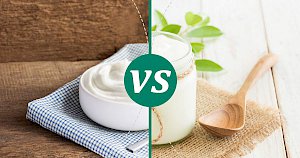Plain Yogurt vs Greek Yoghurt: Calories & Nutrition Showdown


Plain yogurt vs Greek yoghurt
Nutrition Facts
Serving size:
change
5g10g15g20g30g40g50g60g80g100g120g140g160g180g200g220g250g300g350g400g450g500g600g700g800g900g1000g
1oz2oz3oz4oz5oz6oz7oz8oz10oz12oz15oz20oz25oz30oz35oz40oz50oz
Amount Per Serving:
Serving size:
change
5g10g15g20g30g40g50g60g80g100g120g140g160g180g200g220g250g300g350g400g450g500g600g700g800g900g1000g
1oz2oz3oz4oz5oz6oz7oz8oz10oz12oz15oz20oz25oz30oz35oz40oz50oz
Amount Per Serving:
Plain Yogurt vs Greek Yoghurt 100g Compare
| per 100g | Plain yogurt | Greek yoghurt |
|---|---|---|
| Calories | 59 | 59 |
| Carbohydrates | 3.6 g | 3.6 g |
| Fat | 0.39 g | 0.39 g |
| Protein | 10.19 g | 10.19 g |
| Water | 85.1 g | 85.1 g |
| Calcium | 110 mg | 110 mg |
| Iron | 0.07 mg | 0.07 mg |
| Magnessium | 11 mg | 11 mg |
| Phosphorus | 1 mg | 1 mg |
| Potassium | 141 mg | 141 mg |
| Sodium | 36 mg | 36 mg |
| Zink | 1 mg | 1 mg |
| Vitaminium A | 4 µg | 4 µg |
| Vitaminium B1 (Thiamine) | 0.023 mg | 0.023 mg |
| Vitaminium B2 (riboflavin) | 0.278 mg | 0.278 mg |
| Vitaminium B3 (Niacin) | 0.208 mg | 0.208 mg |
| Vitaminium B6 | 0.063 mg | 0.063 mg |
| Vitaminium B9 (Folic acid) | 0.007 mg | 0.007 mg |
| Vitaminium E | 0.01 mg | 0.01 mg |
Discover the Delicious World of Plain Yogurt and Greek Yoghurt
Yogurt, in its many forms, has been a staple in diets around the world for thousands of years. The creamy texture, tangy taste, and health benefits it brings to the table have made it a favorite among health enthusiasts and food lovers alike. Among the vast array of types, plain yogurt and Greek yoghurt stand out for their versatility and nutritional profile. But what sets them apart? Let's delve into the interesting world of these dairy delights to find out more.
A Tale of Two Yogurts
At first glance, plain yogurt and Greek yoghurt might seem remarkably similar, and in terms of basic nutritional content, they are. Both contain roughly the same amount of calories, carbohydrates, fat, protein, and sugar, as well as essential minerals like calcium, iron, and magnesium. However, the devil is in the details, and the differences between them go beyond just texture and taste.
The Creamy Classic: Plain Yogurt
Plain yogurt is celebrated for its smooth, creamy consistency and slightly tangy flavor. It is incredibly versatile, finding its way into smoothies, dips, and a variety of dishes. Plain yogurt is made by fermenting milk with live bacteria cultures, which not only aids in digestion but also contributes to a healthy gut microbiome. Its liquid content gives it a pourable consistency, making it an excellent base for sauces and dressings.
The Thick and Rich: Greek Yoghurt
Greek yoghurt, on the other hand, is known for its thick, rich texture and a more pronounced tangy taste. The thickness is achieved by straining the yogurt to remove the whey, resulting in a product that is denser in protein. This process not only concentrates the yogurt’s flavor but also its nutritional value, making Greek yoghurt a favorite among those looking to increase their protein intake without significantly increasing calorie consumption.
Nutritional Nuances
While the basic nutritional values of plain yogurt and Greek yoghurt are similar, the straining process used in making Greek yoghurt impacts its nutritional profile. Greek yoghurt generally contains fewer carbohydrates and sugar due to the removal of whey but boasts a higher protein content, making it an excellent choice for muscle repair and satiety. Additionally, Greek yoghurt often has a lower lactose content, which can be beneficial for those with lactose intolerance.
Choosing Between the Two
The choice between plain yogurt and Greek yoghurt ultimately comes down to personal preference and dietary needs. If you're looking for a lighter, more versatile option that can easily be incorporated into a variety of recipes, plain yogurt might be the way to go. However, if you prefer a thicker texture and a protein-packed snack that can keep you feeling full longer, Greek yoghurt could be your best bet.
Both plain yogurt and Greek yoghurt offer a wealth of health benefits, including probiotics, essential vitamins and minerals, and a good dose of protein. No matter which you choose, incorporating these yogurts into your diet can contribute to a balanced and nutritious eating plan. So why not experiment with both and discover the unique flavors and textures each has to offer?
Plain yogurt 100g
59kcalCalories source
- 25% CARBS.
- 69% PROTEIN
- 6% FAT
Greek yoghurt 100g
59kcalCalories source
- 25% CARBS
- 69% PROTEIN
- 6% FAT
Compares of natural yogurt
- Plain Yogurt vs White Cheese
- Plain Yogurt vs Cottage Cheese
- Plain Yogurt vs Whole Milk
- Plain Yogurt vs Buttermilk
- Plain Yogurt vs Goat Milk
- Plain Yogurt vs Egg Yolk
- see all compares of plain yogurt
Marcin Piotrowicz
calories-info.com creator
Healthy diet and healthy lifestyle promoter
Add comment